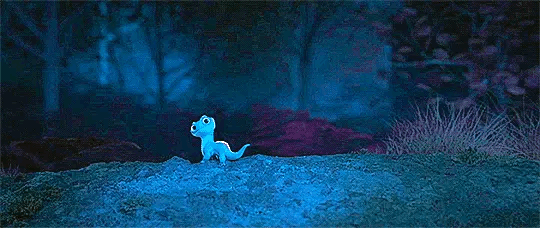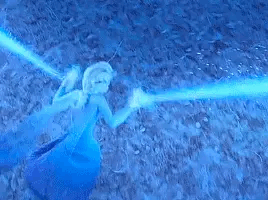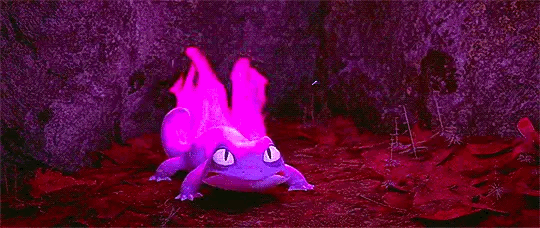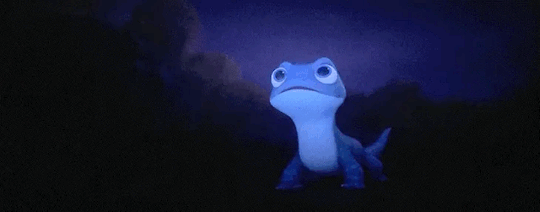Note
I was rewatching and just realized after 'Into the Unknown' that since it's basically Elsa's subconscious talking to her, it makes sense that it didn't act up this intensely until Anna turned 21. Subconsciously, Elsa's probably realized that she could lawfully hand the reins over on Anna's birthday and therefore might have started hearing the 'voice' around then.
I have been dying to write about the catalyst that begins the story. What was so special about 6 years after Iduna’s death—3 years after Elsa becomes queen?

Had Iduna been calling to Elsa for all six years after she died, and Elsa was never able to hear her?
Or was Elsa able to hear her from the start, and Iduna just didn’t call to her until three years into Elsa’s reign?
Or had Gale been seeking out Elsa to bring Iduna’s call to her, and that is the moment that Gale found her (“the winds are restless, could that be why I’m hearing this call”)?
Out of all the various contributing factors, I had never considered Anna. But I think you could be right, Anon. Elsa may have consciously been determined to be an effective ruler and be strong for her sister, but when Anna came of age, a new factor appeared: the opportunity to think about something besides being queen of Arendelle, for the first time in her life.

And, as you say, I don’t think she was ever aware of it or made the conscious decision to do so. But suddenly everyone is a little bit older, she is no longer in survival mode, and for the first time in forever she has a chance to do something she wants to do, not that she has to do.
AAaaaaAAAaaaaa〜♪
Thank you so much for this!
443 notes
·
View notes
Text


506 notes
·
View notes
Text
Kristoff’s Indifference
Kristoff’s consistent ability to be completely unimpressed by Elsa is one of the more endearing things about his character.
He does not dislike her (and they have an awful lot in common), but having been raised by mythical creatures he seems to associate Elsa with a being that is closer to rock troll—like his family—than human.

After charades Anna asks him, “Did Elsa seem weird to you?” to which he replies “She...seemed like Elsa.” He does not question Elsa’s moods in the same way he does not question magic: it doesn’t have anything to do with him (or Anna), and there other things he would prefer to focus on (like Anna).

Queen Elsa of Arendelle is the only known magic user in the universe and is—as far as anyone knows—all-powerful. And she politely asks his permission to make temporary use of his wagon and reindeer. And he replies to this direct request from his inhumanly-powerful sovereign with “I’m not very comfortable with the idea of that”.

He is not impressed by royalty. He is not cowed by magic, which has got to be a breath of fresh air for Elsa. And he does not interact with Elsa for the rest of the movie, before giving her an awkward “sibling-in-law” hug and asking if she cut her hair or something. When she answers “or something”, he responds with “Oh.” That was the beginning and end of his interest in her journey beyond death’s veil. He then immediately proceeds to tell Anna it is in fact she who is the most extraordinary person he’s ever known.

Kristoff is a treasure.
2K notes
·
View notes
Text

...did Elsa literally destroy the memory of Hans?
What are Ahtohallan’s projections, exactly? Are they just images of the past—“moments in time”, like she made in the forest—or is there a possibility that they’re something more powerful altogether?
After surviving forced amnesia from the trolls, did Anna just have her memory involuntary wiped of the moment she and Hans first met?
It would be hard to blame Elsa for it since there is no way anyone would have assumed that Ahtohallan’s powers are that extensive...but even if she knew what would happen, would she have done it anyway?
Would like to think she would at least ask for consent, first.
What if Ahtohallan isn’t just a library, with copies of things others have made for easy reference. What if it is where experiences themselves are stored, and things that everyone remembers on their own are the copies?
#can i borrow your cart and sven cause I’m going down the rabbit hole#Elsa#Anna#Hans#Frozen 2#Frozen#Ahtohallan#Disney
225 notes
·
View notes
Text






Themes in Finding Nemo and Frozen 2
175 notes
·
View notes
Text
Elsa and Physical Contact
Anna has always been the more openly affectionate of the two sisters, even before the 13 years of physical isolation that would form Elsa’s appreciation of respect for her personal space.

Upon a rewatch of Frozen 2 I kept a tally of the number of physical interactions that Elsa instigated throughout the movie, to compare with the number of times someone else approached her and she merely allowed it (not including the shot where Elsa held hands with Yelena and Honeymaren, or any other scene where there is no proof of who instigated the interaction).
The results were: 3 instances where both sisters approach one another simultaneously.



2 instances where Yelena approaches Elsa, once to introduce the People of the Sun and once when she assures her they can leave for the north in the morning.
9 instances instigated by Elsa (1 hug with Anna before sending her away, 6 times they held hands, 1 time holding hands with Olaf and 1 group hug at the end).


15 instances instigated by Anna (4 times she hugged Elsa, holding her hand 4 times and touching her arm or shoulder 7 times).


And 1 mutual “siblings-in-law” hug with Kristoff which was as cute as it was awkward for everyone involved.

With a total of 30 physical interactions, Elsa being an active participant in 13 of them is actually very impressive.
But it is worthwhile to note that while Elsa is the instigator behind less than half of the human interactions she experiences, she actively pursues almost every salamander, horse and reindeer interaction that she has.

Once again, Elsa and Kristoff have something in common: Reindeers (and reptiles and horses) are better than people.
368 notes
·
View notes
Text
@edgy-kiid first posted this news concerning the original English release of Forest of Shadows, which @lydenwut then followed up with concerning the French-language release:


And here is a new addition in the form of the Japanese-language translation:


Tuva is referred to as Ada’s “partner”.
In this context there is no attempt to insinuate “business partner” or “close friend”; the word is being used much like it is in the English lexicon between two people, heterosexual or otherwise, in a romantic relationship.
But the translation does do away with the fact that the two are married, which I do not believe would have been done if one of them had originally been male, which is a shame.
Given that both “Ada” and “Tuva” are fairly gender-neutral sounding names I am pleased that the translator did not try to retcon anyone’s gender, as has happened with France. And the wording does acknowledge that it is a romantic relationship between two women, instead of insinuating that they just happen to work together or are cousins (as the U.S. release of Sailor Moon infamously did to Uranus and Neptune).
But just because it could have been worse does not mean it should not have been better, and it definitely should have been.
171 notes
·
View notes
Text





Love is an open door
#Frozen 2#frozen 2 spoilers#Elsa#Anna#Significantly fewer doors than doorways in this movie than the last
328 notes
·
View notes
Text
Guides and Guardians
It has been mentioned before that the Nokk may be serving as the guardian to the glacier. Elsa passed the test and gained access to Ahtohallan—her parents did not.

But what of Gale and Bruni? The land-based elemental spirits were happy to guide the sisters to the Nokk and what would have been their deaths if Elsa hadn’t been what they thought she was. We don’t know what the earth giants were going to do, but if Bruni and Gale can hear Ahtohallan’s call we can assume that they could, as well—were they intending to escort her to Ahtohallan if she could pass their test?

Are they all guardians to Ahtohallan?
Is that why Gale and Bruni attacked Elsa? They wanted to test her strength first themselves, before sending her off to be potentially killed by the Nokk?


Were there other people before Elsa whom they’d tested and bested, and thus refused to guide to Ahtohallan? Were there other people that had managed to beat the land spirits like Elsa did? Had the spirits guided them north only for them to fail the Nokk’s final test?
It would explain why Elsa’s death didn’t seem to surprise them—to borrow from a movie about a different Norse legend, “Another Day, Another Doug”.

421 notes
·
View notes
Text
“You All Came Back”
After Olaf is resurrected, the first thing he does is acknowledge everyone by name and summarily announce, “You all came back!”

I found this rather odd as Olaf was the one who came back, after dying, but then considered the events of the movie from his perspective: as far as anyone knew, Sven and Kristoff did just leave them. Elsa did as well, sending Olaf and Anna back the way they’d come to move on alone.

Anna, however, stayed with him until the very end and he was the one who left her—except, there is that second-to-last line he had before flurrying away: “You’re going to have to do this next part on your own.” He was sending her away, to continue on without him.

Combined with Ahtohallan’s promise to make everyone “face what you most fear”, it looks like Olaf and Anna shared the same worst nightmare of being left behind.

#there is a concept drawing where baby elsa bases Olaf’s design on Anna and that makes a lot of sense now#Olaf#Anna#Frozen 2#frozen 2 spoilers#Elsa#Kristoff#Sven
356 notes
·
View notes
Text
Frozen 2: Gale’s Story
After their passage through the mist, Gale tornadoes the main five to determine which of them it is that is giving off all the magical vibes.

Elsa reveals herself, Gale drops the spares and has a brief exchange with Elsa, which ends in what is the closest the wind can ever really come to hand-to-hand combat.
At the point where it seems the two are equally matched, Gale reveals four things to Elsa: her father seeing her mother for the first time, a parade of sword-wielding arms, King Runeard swearing “For Arendelle”, and an echo of Iduna calling Gale to her.

At first viewing I’d been curious about what was so important about those things that Gale chose them, first and foremost, to show to Elsa. But it seems to be a brief summary of the day the forest fell, as seen from Gale’s perspective. The circle of ice statues that appear after Elsa wins the bout of magical arm wrestling: Elsa calls them “moments in time”. Does Elsa Elsa’s magic essentially use Gale like a mold to create frozen impressions of the people/things that occupied that space at one point or another on that day in history?

Gale not only knew everything from King Runeard’s secret to Iduna’s final resting place, but she saved Olaf’s flurry for his eventual resurrection and may even have been the one who guided Ahtohallan’s call to Elsa in the first place (“The winds are restless. Could that be why I’m hearing this call?”)
If she was able to talk the movie would have been about 15 minutes long, but instead she was trapped right alongside the Northuldra for 34 years knowing exactly what happened, why it happened, how to fix it—and unable to communicate a thing.
It’s amazing she didn’t go insane. No wonder she was so happy to see the sisters.
396 notes
·
View notes
Text
Anna’s Fears
Anna’s amazing selflessness has been discussed a few times already, with “I don’t want to stop you from being whatever you need to be” being an excellent example of it.
She follows that up with “I just don’t want you dying, trying to be everything for everyone else too”, and at first that line seemed rather forced, to me. By this point Elsa has spent the entire movie looking for the source of a voice that she alone can hear; that doesn’t really mesh with the idea that she’s risking her life by trying to meet other people’s expectations of her.


And then I remembered an earlier expression of concern from Anna, after Elsa made her promise to Yelena and Matthias: “That’s a big promise, Elsa.”
That promise to free the forest and restore Arendelle had frightened Anna, and she’d carried that fear inside her until Elsa’s bid to strike out alone forced her hand. Anna had seen what was coming from the start—and she’d been scared the entire time.

She doesn’t “know the woods” like Kristoff, and was scared from the moment they stepped through the mist. She doesn’t have intuitive knowledge of whether or not her sister is okay, like Olaf, and was perpetually scared for Elsa. And she was scared of magic, as the only one who had ever been on the receiving end of magical violence.
I would say Anna spends 90% of the movie—from the moment they enter the forest to the moment she reunites with her undead sister—absolutely terrified.
And yet she still overcomes to lead a 5-person army, fight back against her dead grandfather and keep Elsa’s promises for her.
I secretly used to wonder if Anna’s insistence on “we do this together” meant that she’d intended to die with Elsa if it had come to that, but it is quite clear that Anna was never going to go down without a fight.
#frozen 2 spoilers#Anna#Elsa#Next time I see the movie I am going to count how often Anna looks absolutely terrified#Cause it is quite often#Frozen 2#Disney
480 notes
·
View notes
Text

Elsa vs. Gale

Elsa vs. Bruni

Elsa vs. The Nokk

582 notes
·
View notes
Text
The Cycle of the Fifth Spirit
Original Theory: Elsa is the first fifth spirit, ever.
The Northuldra had their own independent relationships with the elements, so they wouldn’t have needed a bridge—they interacted with nature directly themselves. It wasn’t until King Runeard came in and ruined everything that suddenly the spirits and the humans required someone to step in and keep the peace. That’s why there wasn’t an ice spirit at all until Elsa showed up: they’d never needed one before.
Counter: Except for the fact that the legend of the fifth spirit had been passed down through generations, as proven by Iduna’s scarf, “from one of (their) oldest families”.

Argument: How can “the bridge between (humans) and nature” be a legend at all? They’re not a very good bridge if no one knows who they are. Either there is someone between the humans and the spirits, or there isn’t. If there isn’t a bridge then there isn’t a fifth spirit—or wasn’t, until Elsa.

New Theory: Elsa isn’t the first Fifth Spirit ever, but she is the first one in a long time.
We don’t know if the spirits are immortal or not. If water, earth, wind and fire have always existed, it’s possible that the ice spirit is unique in that it comes and goes according to the changing needs of the people and of nature, just like snow comes and goes with the changing of the seasons.
There was no fifth spirit before Elsa was born because there was no need for a bridge—humans and nature lived in harmony, so there was no gap to cross. Then Runeard happened, so Ahtohallan put everyone in time out until Elsa and Anna took up the mantle.

They’re the first fifth spirit in their lifetime, but it’s likely that this is a cycle that Ahtohallan has instigated at least once before. That is how the knowledge of a fifth spirit can fade away into rumor and legend amongst the very people it is supposed to be in contact with. (And also why Ahtohallan gives off the vibe of being the ruins of a place that someone else had already designed before Elsa came along.)
Maybe the role of “bridge” is passed down through the family, or maybe it’s not. But I can definitely see how it might be a cycle. The fifth spirit appearing, doing its job and fading away, until something else happens three generations later and tears open a new rift that needs bridging.
#I have been trying to keep my posts concise recently#oops#frozen 2 spoilers#Frozen#Elsa#Anna#Disney#frozen theory#the fifth spirit
487 notes
·
View notes
Text
Being Whatever You Need to Be
Anna had several unexpected lines in Frozen 2, and this one hit hard.

She didn’t say “whatever you want to be”.
She didn’t say “whatever you’re trying to be.”
She didn’t even say “whatever you feel you need to be”.
Even at this point in the story Anna had an idea that Elsa was becoming something or someone else, and in the face of her beloved sister changing in ways she couldn’t verbalize, Anna says: “I don’t want to stop you.”
She didn’t understand but didn’t need to understand. All she knew was that it was important to Elsa. And that was enough.
Anna is freaking amazing.
1K notes
·
View notes
Text
Frozen 2 and Family
With Frozen 2 we got a villain unlike anything we‘ve seen in the past 25 years, and only once before in the history of Disney animation: a direct blood-relative of the main character.

From 1994 to 2019, the Lion King’s Scar was the first and only time a villain’s role was filled by a family member, because Hamlet. Unlike the Lion King, however, Frozen 2 was the sequel to a movie that spent 109 minutes showcasing the importance of family ties to its audience.

We came close with Tangled, as Gothel represented herself as Rapunzel’s mother, but Frozen 2 took Frozen’s point of the importance of family, and then asked “But what if?”

Personally, I find this excellent.
Aside from bringing some balance to fairy tales as a whole (that have always been more willing to vilify female family members), the movie acknowledges that every family has skeletons in the closet: a racist aunt, a sexist cousin, a violent father. We have all heard, repeatedly, that blood is thicker than water. But being related to someone does not make them a good person, and it does not mean you have to condone their actions, no matter how awful.

Sometimes it means that you have to tear that sword out of their hand, take a stand and do the next right thing.
#frozen 2#frozen 2 spoilers#king runeard#Disney#Elsa#Anna#Not everyone gets on with their family and thats okay too
737 notes
·
View notes
Text
Kristoff and Elsa: Parallels
From the ages of 8 to 21 they held a sensitive secret that kept them isolated from society. Anna rescues them from a lonely life spent physically cut off from the rest of the world.

What was Kristoff’s life like, exactly, for the thirteen years between his kidnapping adoption and Anna? He could never tell anyone anything about himself that wasn’t a lie and still keep the secret of his upbringing—a problem easily solved by never befriending anyone who wasn’t a reindeer.

We see no proof that he has ever had a single human friend, ever—the trolls confirm Kristoff’s isolation in the first movie—and that sounds a lot like someone else who is also very close to Anna.
While Elsa grew up as a prisoner and Kristoff was raised in a place with no walls whatsoever, it’s interesting that they both end up so isolated—and that Anna had such a hand in connecting them both with their own humanity.

And that humanity that was pivotal in preparing Elsa for her future as a spirit of ice, and in readying Kristoff for his position as King Consort.
Thanks to Anna, two socially impaired people who spent 13 years in isolation achieve lives beyond their wildest imaginations.
Once again, everyone needs a friend like Anna.
761 notes
·
View notes